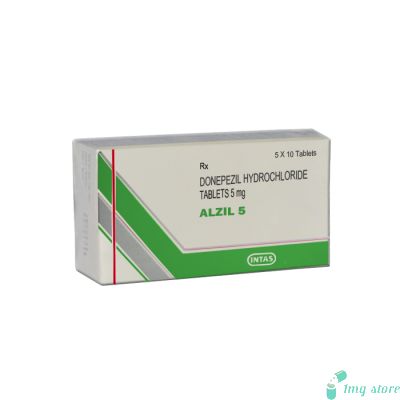Aricep Tablet (Donepezil)
Aricep Tablet, also known as Donepezil, is a prescription medication commonly used in the treatment of dementia, specifically in individuals with Alzheimer's disease. It belongs to a class of drugs called cholinesterase inhibitors
What is Aricep Tablet (Donepezil)?
Aricep Tablet, also known as Donepezil, is a prescription medication commonly used in dementia treatment, specifically in individuals with Alzheimer's disease. It belongs to a class of drugs called cholinesterase inhibitors, which work by increasing the levels of certain chemicals in the brain that are involved in memory, thinking, and other cognitive processes.
Aricep Tablet is primarily prescribed to improve cognitive function, memory, and overall mental performance in patients diagnosed with Alzheimer's disease. It does not cure the condition but may help slow down the progression of symptoms and improve the quality of life for patients and their caregivers.
Dementia is a broad term that refers to a decline in cognitive abilities, such as memory loss, problem-solving difficulties, and impaired thinking skills, that are severe enough to interfere with daily activities. Alzheimer's disease is the most common form of dementia, accounting for a significant number of cases. Aricep Tablet is specifically approved for the treatment of Alzheimer's disease and is not recommended for other types of dementia. As a memory improvement drug, Aricep Tablet is designed to enhance cognitive function, particularly memory, and attention, by boosting the availability of certain neurotransmitters in the brain. By inhibiting the breakdown of acetylcholine, a key neurotransmitter involved in memory and learning processes, Aricep Tablet helps to maintain higher levels of acetylcholine in the brain, improving communication between brain cells and potentially enhancing memory function.
It is vital to take note that Aricep Tablet is a doctor-prescribed medicine and ought to just be utilized under the direction and management of certified medical care proficient. The measurement and term of treatment will differ contingent upon individual conditions, and it is critical to adhere to the endorsed directions and rules given by the medical care supplier. While Aricep Tablet can be beneficial for some individuals with Alzheimer's disease, it may not be suitable for everyone. Potential side effects and interactions with other medications should be discussed with the prescribing doctor before starting this treatment. Regular follow-up appointments and monitoring may be necessary to evaluate the response to the medication and make any necessary adjustments to the treatment plan.
In conclusion, Prescription medicine for Alzheimer's is used in the treatment of dementia. It is a memory improvement drug that works by increasing the levels of certain brain chemicals involved in cognitive function. However, it is essential to consult with a healthcare professional to determine if this medication is appropriate and safe for an individual's specific condition.
Aricep Tablet (Donepezil) offers several benefits in the treatment of dementia, particularly in individuals diagnosed with Alzheimer's disease. By increasing the levels of acetylcholine in the brain, this medication can potentially improve cognitive function, memory, and thinking abilities. It may help slow down the progression of symptoms and enhance overall mental performance, thereby enhancing the quality of life for both patients and their caregivers. Although it does not cure the condition, Aricep Tablet can have a positive impact on memory and attention, providing individuals with the opportunity to maintain independence and engage in daily activities for a longer duration. It is important to note that the specific benefits and responses to the medication may vary from person to person, and it is crucial to consult with a healthcare professional for personalized guidance and monitoring.
Some of the Safety Advise to be taken while using Donepezil Tablet:
When using Aricep Tablet as a Neurology Drug for the treatment of dementia, particularly Alzheimer's disease, it is important to take certain precautions. Firstly, it should only be used under the supervision and guidance of a qualified healthcare professional. The healthcare provider will determine the appropriate dosage and duration of treatment based on the individual's specific condition. It is important to follow the prescribed instructions and guidelines provided. Additionally, it is crucial to inform the healthcare provider about any existing medical conditions, allergies, or medications being taken, as they may affect the suitability or dosage of Aricep Tablet. Regular monitoring and follow-up appointments are essential to evaluate the response to the medication and to address any potential side effects or interactions. It is also important to note that Aricep Tablet may not be suitable for everyone, and the decision to use this medication should be made after careful consideration of the individual's overall health and specific circumstances.
Key Uses Points of Donepezil Tablet are:
Alzheimer's disease: Aricep Tablet is approved for the treatment of mild to moderate Alzheimer's disease. It is prescribed to help manage the cognitive symptoms associated with this progressive neurological disorder, such as memory loss, confusion, and difficulty with thinking and reasoning.
Cognitive function improvement: Donepezil Tablet is known to enhance cognitive function in individuals with Alzheimer's disease. It may help improve memory, attention span, and overall mental performance. By increasing the levels of acetylcholine, a neurotransmitter involved in memory and learning, Aricep Tablet aims to optimize brain function in individuals with dementia.
Symptom management: Donepezil Tablet is used to manage the symptoms of Alzheimer's disease, including cognitive decline, behavioral changes, and difficulties in performing daily activities. While it does not cure the underlying condition, Aricep Tablet can help slow down the progression of symptoms and improve the quality of life for both patients and their caregivers.
Supportive care: Aricep Tablet is often prescribed as part of a comprehensive approach to Alzheimer's disease management. Along with lifestyle modifications, caregiver support, and other treatments, Aricep Tablet plays a role in providing supportive care to individuals affected by dementia.
It is critical to know about these likely incidental effects of the Donepezil Tablet:
Common side effects of Aricep Tablet may include:
Gastrointestinal issues: Nausea, vomiting, diarrhea, and loss of appetite are some common gastrointestinal side effects associated with Aricep Tablet. These side effects are usually mild and temporary, but if they persist or worsen, it is advisable to inform the healthcare provider.
Muscle cramps: Some individuals may experience muscle cramps while taking Donepezil Tablet. Extending practices and sufficient hydration might assist with lightening these issues. On the off chance that they become extreme or tireless, looking for clinical advice is significant.
Fatigue: Feeling tired or fatigued is another possible side effect of the Donepezil Tablet. It is recommended to get sufficient rest and engage in moderate physical activity to manage fatigue. If fatigue persists or becomes bothersome, discussing it with the healthcare provider is advised.
Insomnia: Difficulty falling asleep or staying asleep, also known as insomnia, can occur in some individuals taking Aricep Tablet. Maintaining good sleep hygiene practices, such as avoiding stimulating activities before bedtime and creating a comfortable sleep environment, may help alleviate this side effect. If insomnia persists or significantly affects daily functioning, it should be reported to the healthcare provider.
Dizziness: Aricep Tablet may cause dizziness in some individuals, especially when changing positions quickly (such as standing up too fast). It is important to rise slowly from a seated or lying position to minimize the risk of dizziness and associated falls.
Other possible side effects: Rarely, Aricep Tablet may cause side effects such as headaches, abnormal dreams, hallucinations, fainting, or slow heart rate. These side effects should be reported to the healthcare provider promptly.
It is essential to remember that not everyone will experience these side effects, and their severity may vary among individuals. If any side effects are persistent, bothersome, or concerning, it is important to seek medical advice. The healthcare provider can provide guidance on managing side effects or make adjustments to the dosage or treatment plan, if necessary.
Q: Can Aricep Tablet be used for any type of dementia other than Alzheimer's disease?
A: Aricep Tablet is specifically approved for the treatment of Alzheimer's disease and is not recommended for other types of dementia. It works by targeting the specific neurotransmitter imbalances associated with Alzheimer's disease.
Q: How long does it take for Aricep Tablet to show its effects?
A: The response to Aricep Tablet can vary from person to person. Some individuals may experience improvements in cognitive function and memory within a few weeks of starting the medication, while others may require several months to notice significant changes. It is important to continue taking the medication as prescribed and consult with a healthcare professional for personalized guidance.
Q: Could Donepezil Tablet at any point be utilized in a mix with other Alzheimer's meds?
A: at times, Donepezil Tablet might be endorsed in the mix with different meds used to treat Alzheimer's illness, for example, memantine. The mixed treatment is resolved in light of individual conditions and ought to just be started and observed by a medical services proficient.
Q: Are there any lifestyle changes or non-drug treatments that can complement the use of Aricep Tablet?
A: Yes, alongside medication, certain lifestyle changes can help improve cognitive function and overall well-being. These include engaging in regular physical exercise, maintaining a balanced diet, engaging in mentally stimulating activities (such as puzzles or reading), getting enough sleep, and staying socially active. These lifestyle modifications can support the effects of Aricep Tablet in managing dementia symptoms.
Q: Can Aricep Tablet be safely used in older adults?
A: Aricep Tablet can be used in older adults; however, it is important to monitor its use and adjust the dosage if necessary. Older adults may be more sensitive to the effects of the medication and may require a lower initial dose.
Q: Can Aricep Tablet be used during pregnancy or while breastfeeding?
A: The safety of Aricep Tablet during pregnancy and breastfeeding has not been established. It is important to inform the healthcare provider if you are pregnant, planning to become pregnant, or breastfeeding to assess the potential risks and benefits.
Q: Can Aricep Tablet be stopped abruptly?
A: It is recommended not to stop Aricep Tablet abruptly without consulting with a healthcare professional. Sudden discontinuation may lead to a rapid return of symptoms. The dosage should be gradually tapered off under the guidance of the healthcare provider.
Q: How long is Aricep Tablet typically prescribed for?
A: The duration of Aricep Tablet treatment varies depending on the individual's response to the medication. It is typically prescribed for a prolonged period, often indefinitely, as it aims to manage and slow down the progression of dementia symptoms rather than providing a cure.
Q: Can Aricep Tablet be taken with or without food?
A: Aricep tablets can be taken with or without food, as directed by the healthcare provider. However, taking it with food may help reduce the likelihood of gastrointestinal side effects, such as nausea. It is advisable to follow the specific instructions provided by the healthcare professional.
Some medications that may interconnections with Donepezil Tablet include:
Anticholinergic drugs: These drugs work by blocking the action of acetylcholine, which is the same mechanism of action as the Donepezil Tablet. Taking anticholinergic drugs simultaneously with Aricep Tablet might decrease the viability of the two prescriptions or lead to expanded secondary effects.
Nonsteroidal anti-inflammatory drugs (NSAIDs): NSAIDs, such as ibuprofen and naproxen, can increase the risk of gastrointestinal bleeding when taken with Aricep Tablet. It is advisable to use these medications cautiously and under the guidance of a healthcare professional.
Certain antidepressants: Some antidepressant medications, such as tricyclic antidepressants and selective serotonin reuptake inhibitors (SSRIs), may interact with Donepezil Tablet and increase the risk of side effects, such as nausea, vomiting, or changes in heart rate.
Medications affecting liver enzymes: Certain medications, such as ketoconazole and rifampin, can affect the metabolism of Aricep Tablet in the liver, potentially altering its effectiveness. Dose adjustments or alternative medications may be necessary in such cases.
It is important to consult with a healthcare professional to understand the potential drug interactions and their implications. The healthcare provider can assess the individual's medication profile and make appropriate recommendations to minimize the risks associated with drug interactions. Regular communication and updates regarding any changes in medications are crucial to ensure the safe and effective use of Aricep Tablet in the treatment of dementia.
| Manufacturer | : | Eisai Pharmaceuticals India Pvt Ltd |
| Equivalent Brand | : | Aricept |
| Generic Search | : | Donepezil |














